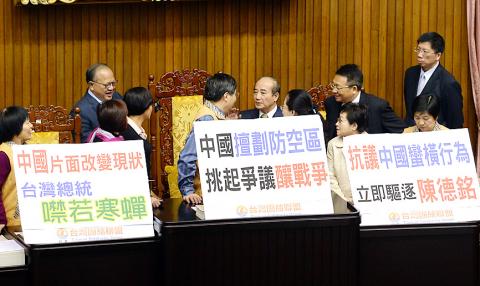|
Resolution urges air
zone protest
STABILITY: The Executive Yuan also issued a
four-point statement calling for a peaceful resolution of disputes, but failed
to address the legislative call
By Chris Wang and Shih Hsiu-chuan / Staff reporters

Members of the Taiwan Solidarity
Union take over the podium at the legislature in Taipei yesterday as Legislative
Speaker Wang Jin-pyng steps in to sort out the issue.
Photo: Wang Yi-sung, Taipei Times
The legislature’s caucus leaders,
including the Chinese Nationalist Party (KMT), yesterday approved a non-binding
resolution demanding that President Ma Ying-jeou’s (馬英九) administration lodge an
official protest with China over its unilateral demarcation of an air defense
identification zone (ADIZ) in the East China Sea.
The resolution asks Ma to file a stern protest against the Chinese demarcation,
which it said has destabilized regional stability, and to take concerted action
with the nation’s democratic allies by refusing to submit flight plans as
Beijing has requested.
It also states that Beijing’s announcement of the ADIZ on Saturday last week and
the Chinese aircraft carrier Liaoning’s passage through the Taiwan Strait on
Thursday have escalated tensions that not only affect Taipei, but also Tokyo,
Seoul and Washington.
The resolution calls on China to exercise restraint, resolve the dispute with
Japan, South Korea, Australia, Taiwan and the US through multilateral
negotiations, and advises that China withdraw the demarcation to safeguard peace
in the area.
Earlier yesterday, Taiwan Solidarity Union lawmakers had occupied the
legislative podium to protest China’s action and called for a boycott of
legislative proceedings. The deadlock was broken after Legislative Speaker Wang
Jin-pyng (王金平) convened a cross-party meeting, and all party caucuses reached a
consensus on the resolution.
However, the TSU’s proposal that visiting Association for Relations Across the
Taiwan Straits Chairman Chen Deming (陳德銘) should be expeled was not included in
the resolution.
The Executive Yuan issued a five-point statement in response to the resolution
later yesterday.
First, the National Security Council had issued a four-point statement on
Saturday last week in response to China’s ADIZ demarcation, in which it said
that the government would firmly safeguard its sovereignty over the Diaoyutai
Islands (釣魚台) and urges all concerned parties to exercise self-restraint to
resolve regional disputes peacefully, the Executive Yuan said in the statement.
Second, China did not consult Taiwan before announcing its new ADIZ demarcation,
which overlaps with Taiwan’s air defense zone and the Taipei Flight Information
Region. This has not contributed to positive cross-strait relations, it said,
adding that the government would “express our firm and serious concern to the
mainland [China] through appropriate channels.”
Third, China’s air defense zone will not change how the military conducts
operations in the region, and the military will increase inspections in the area
to enhance air and sea defenses to protect national security and public
interests, the statement said.
Fourth, the Civil Aeronautics Administration will handle issues related to the
requirement imposed by China that commercial flights notify China before planes
fly through the newly designated zone in line with related International Civil
Aviation Organization regulations and based on requests made by airlines to
ensure aviation safety, it said.
Fifth, the government is extremely concerned about how the situation develops
and has made unequivocal calls to concerned parties to resolve disputes through
bilateral or multilateral channels and in a peaceful manner to jointly maintain
peace and stability in the region, the Executive Yuan said.
Executive Yuan spokesperson Cheng Li-wun (鄭麗文) declined to to elaborate when
asked about the statement.
|
![]()
![]()
![]()